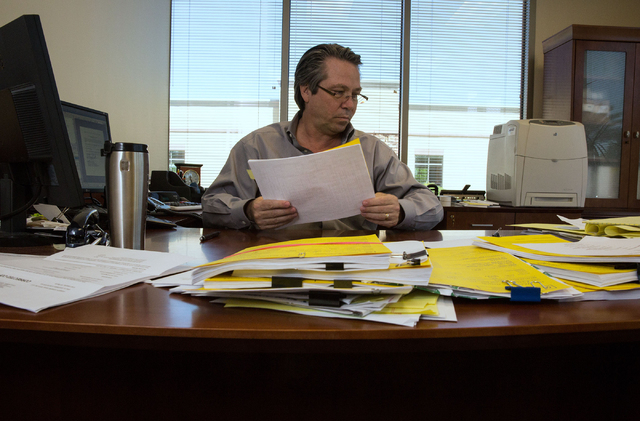Accountants, tax preparers scramble to help hit tax deadline
It’s that time of year not only for accountants and tax preparers but the rest of us who procrastinate with the April 15 tax deadline looming.
Phones were ringing briskly at Las Vegas accounting firms this week, and tax preparers were meeting with clients, some who wait until the last minute to file their taxes.
“This year it seems to me like there’s a lot more last-minute people,” said Laurie A. Lee, who has her own accounting firm. “I still have people calling me telling me they’re sending over their stuff.”
Lee said she doesn’t know why people procrastinate. Maybe this year, some were busy complying with the March 31 deadline to sign up for health insurance or face a penalty under the Affordable Care Act.
“It’s not one particular group,” Lee said. “There’s business clients and some younger people, and I had one woman who’s 72 and another who’s 90. I guess I should start asking them why.”
One client was delayed in providing her tax information until the final week, but she had a legitimate excuse, Lee said — she had recently given birth.
Daniel Gerety, president of Gerety &Associates, said some of the last-minute rush is people switching accounting firms and at the last minute. Others are regulars at procrastinating, he said.
“The people who come in late are the same year after year,” Gerety joked. “It’s just their personality.”
Despite the latecomers, Lee said she avoids doing extensions to file tax returns as much as possible to avoid doing returns all year, but sometimes they are needed.
The Internal Revenue Service is auditing more accountants and subjects them to penalties. It’s important that clients bring all of the receipts — sometimes they bring them in shopping bags — and that the information is kept on file, she said.
“We’re supposed to look at every receipt and have backup in our files,” Lee said. “Our clients don’t understand that we have to increase fees because of that (due diligence).”
Extensions are more common this year, said Jason Thomas, a tax partner with Fair, Anderson &Langerman. The reason is the IRS didn’t hand down rules until February on a new 3.8 percent tax on net investment income for the highest tax bracket as a way to help fund the Affordable Care Act.
“We didn’t know rules until February, and that caused some delays on the preparation work,” Thomas said. “It’s tough to fit in everything in 45 days.”
Even though his firm does a lot of extensions as well, Gerety said tax preparation work has gone much smoother this year with the hiring of two additional people. It’s necessary when people are working seven days a week, he said.
The one problem with this year’s tax season is that clients aren’t as happy as they were in the past, he said. It’s not the firm’s fault, but the implementation of the 3.8 percent net investment income tax to help fund the Affordable Care Act and other tax law changes that have cost them money, he said.
With the expiration of the Bush tax cuts and their replacement, the highest tax bracket went from 35 percent to 39.6 percent for individuals making $400,000 and couples earning $450,000, Gerety said. The capital gains tax for the highest bracket rose from 15 percent to 20 percent, and for those who have income from California, that state raised its tax rate, he said.
“It’s not going to affect a lot of people, but a lot of our clients are higher income earners, and they are owing a lot more tax this year,” Gerety said.
As for their reaction to writing bigger checks to the government this year: “They find it very painful,” Gerety said.



















